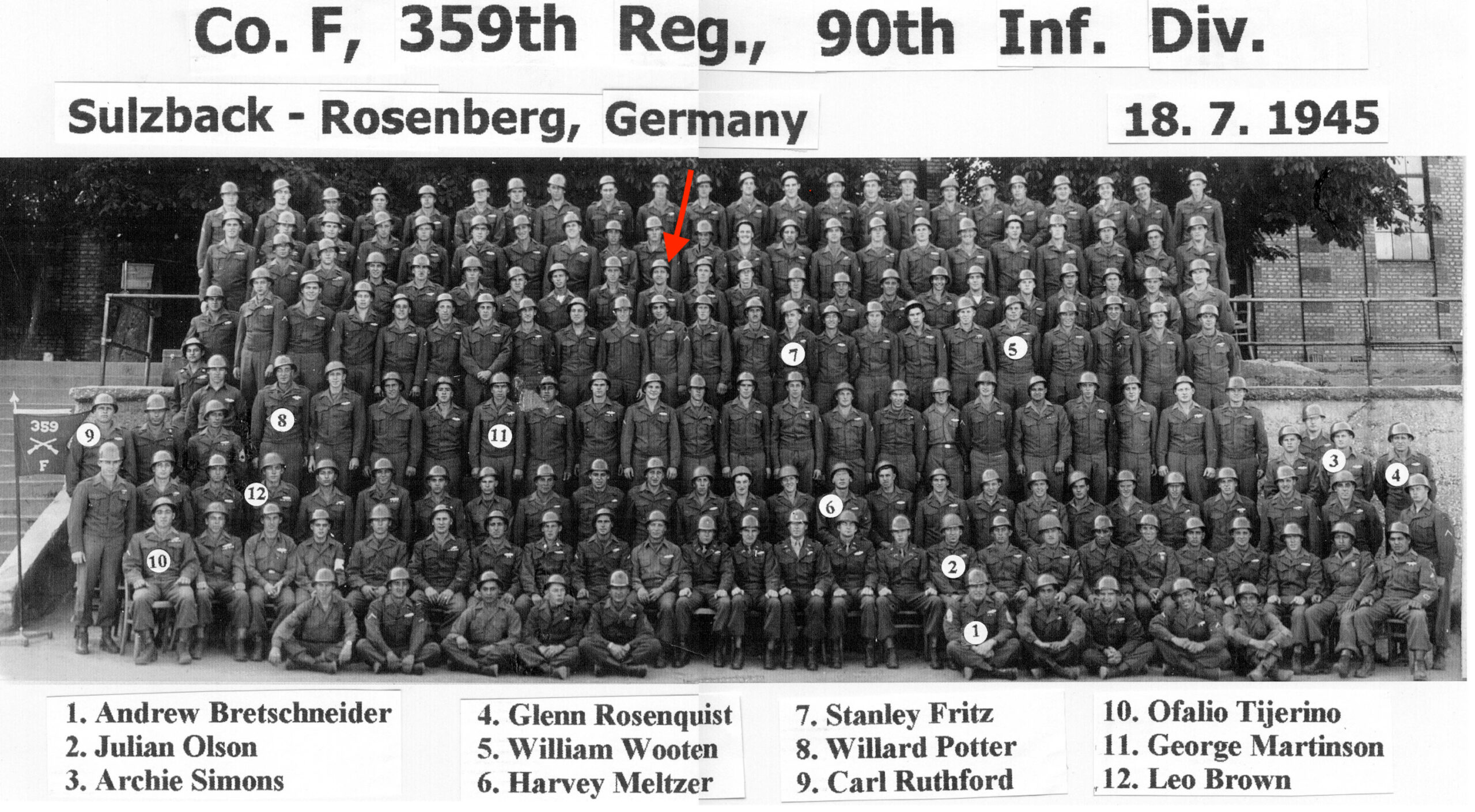Gene Newman, 90, a columnist, blogger and veteran recently joined Project Help as a volunteer working with veterans in need of emotional support. Recently he came across letters written by his brother Jim, a World War II Veteran, while fighting in Europe.
These letters speak from the heart about the day to day life in the trenches. They serve as eye-openers about the bravery of our soldiers and the horror of war.
We hope to share more of these letters periodically as they become available to us.
To put Jim’s first letter into context, it was written 15 days after the war in Europe ended on May 8, 1945. Private Jim at the time was 20 years old. He was in Co. F, 359th Infantry Regiment, which was waiting to be shipped home or to the Pacific Theater. Post war duty included making raids to uncover illegal weapons and black-market activities. The original letter was written in pencil and has faded.
World War II Veteran Letters Series
May 23, 1945
Sulzbach, Germany
Dear Mother & Dad,
I have not written to you yesterday as I did not have any envelopes (a little more about that)… We have just been informed by the mail censorship that we are allowed to tell of our experiences over here.
You might as well know how long it took me to get overseas. It took 11 days. I left the 15th of March of ’44. I am overseas 14 months now. You know I came over on a British ship called Harlem Brigade. I was in Chard, England and Youvil, England. I was there from March 26th until June 13th when we landed in France. You know on June 6th, which of course you know was D-Day I was in the officers’ mess hall at the time the news came in to us. It was good news and yet it meant we would be going over just any day. The news was just coming in all day long on how the invasion was getting along. The boys really did a swell job against the enemy for the first time.
My regiment, the 359th, was coming in on D-Day but their ship was hit. The troops had to abandon ship with no equipment leaving behind everything. I can imagine how they felt and what was on their minds while in the water swimming to shore without something to protect themselves.
I was hit on June 28 by shrapnel from an 88 shell. There were three of us who were hit. I was within a hand’s reach of my BAR man who had been killed. It had been quiet for some time before the shells started to fall in on us. I had just finished eating and washed up. It was about 8 pm. It does not get dark until about 11 pm in France in June. There is just about six hours of darkness.
The boy I had been buddying with was an 18 year old. His name was Raleigh. I cannot recall his first name. He could speak very good French. We did not have any trouble getting cognac which is something like wine and I know you will agree with me Dad. (Dad had been a doughboy in France in WWI.)
My whole squad was a young group. The oldest fellow was 28 years old.
I was back in the hospital in England July 1. You’ll remember that other boy by the name of Newman. He’d been hit in three places and also had a broken leg. He told me he did not know how he broke it. It must have happened when he fell after being hit. He was sent home to the States. I had left just before he did but received a letter from one of the boys in the ward and he told me he was so happy that he could not help but cry. He lives in Ohio. I came back to the outfit on Aug. 25th. There was no one in the squad that I knew.
Sgt. Ferguson was my platoon sergeant. He also lives in Ohio and is living there now as he had stepped on a mine as we had just started out on an attack. That was a very bad day for us as we were moving along so very well without meeting resistance. Things were going along according to plan and all of a sudden in just about all directions we heard explosions. I had thought they were 88’s (artillery). I know I was not the only one.
We had to hit the ground for a few seconds but were told to continue on. It really did get too close for comfort. The officers did not like it and were calling back to headquarters on walkie talkies. The medics had been busy taking care of the boys. As they were getting hit they would call for a medic. They would be there as fast as their feet could take them. They really are the ones who deserve a lot of credit.
We had to find a path we could all follow to safety. There were mines to our left and right. We were to pass back the word letting everyone know where there was a mine. We finally did get to a safety zone but it did take some time. We were then without our medics for three days. They had to take back the wounded. It was just a few days later that we were relieved by another outfit.
We came back to a town a mile or so and went into the buildings. It was then I found I had trench foot. It was lucky we were relieved at that time. If I had been out in the cold a little more I no doubt would be missing a foot. I saw it happen to a lot of the boys. There is nothing you could do for it. It has to heal by itself by keeping your foot dry at all times and keeping it out from under the blanket while sleeping. We took exercises every morning by moving our toes with our fingers and then moving them naturally.
You know, on VE Day (May, 8, 1945) we had set out to make an attack. We were riding on tanks and received news after we had gone just about 10 miles to stop and go into the closest town and stay there.
It really was not too much to cheer about even though we now have time to think a little more than we did then. I have lost a lot of swell friends and can thank God I am still alive.
God bless you all,
Jim
Before signing off, Jim requested that his family send “candy, cookies, fruit cake and canned goods.” According to his brother, “Jim was always a chow hound.”

